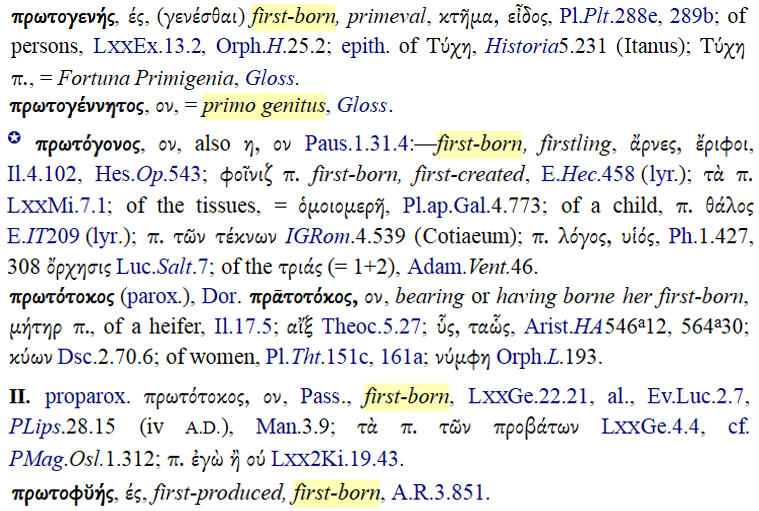The Greek adjective νεόφυτος1 and its declensions occur four times in the LXX,2 all in contexts referring to a plant.3 The adjective itself is composed of νεο- meaning “new” and -φυτος, meaning “planted,” hence the meaning “newly planted.”
Footnotes
1 Although an adjective, it functions as a substantive in the LXX as well as the NT.
2 Job 14:9; Psa. 128:3, 144:12; Isa. 5:7
3 It is used to translate three Hebrew nouns all referring to a plant: נֶטַע, נָטִיעַ, and שָׁתִיל.
The Church is depicted in the New Testament by metaphor as a vineyard, just as it is depicted as a flock,4 and the Lord Jesus Christ is the owner of the vineyard5 and the shepherd of the flock.6 Hence, as a member of the Church (vineyard), a newly baptized Christian convert is also depicted by metaphor as a newly-planted plant (νεόφυτος).
Footnotes
4 1 Cor. 9:7
5 Matt. 20:8
6 Matt. 26:31
The apostle Paul wrote,7
6 I have planted, Apollos watered; but God gave the increase. KJV, ©1769
Ϛʹ ἐγὼ ἐφύτευσα Ἀπολλῶς ἐπότισεν ἀλλ᾽ ὁ θεὸς ηὔξανεν TR, 1550
Footnotes
7 1 Cor. 3:6
By planting, the apostle Paul means making converts (i.e., new plants in the vineyard). By watering, he means edifying, exhorting, and teaching (i.e., nourishing the growth of the newly-planted plants).
Furthermore, the apostle Paul did not say that “the younger man” (ὁ νεώτερος) was disqualified from being a bishop (for Timothy himself was a young man), but rather, the ὁ νεόφυτος—the newly baptized or newly catechized.
In his homily on 1 Tim. 3:6, John of Chrysostom wrote,8
“Not a newly-planted man,” he says. Here he does not mean, “[Not] the younger man,” but rather, “[not] the newly-catechized man.”
Μὴ νεόφυτον, φησίν. Οὐ τὸν νεώτερον ἐνταῦθα λέγει, ἀλλὰ τὸν νεοκατήχητον
Footnotes
8 Homily 10, Ch. 2, p. 549
Regarding the Greek word νεόφυτος, Johann Friedrich Schleusner wrote,9

which may be translated as,
- metaphorical: one who was recently admitted to the religion of the Christians, a novice, newly converted from Paganism or Judaism to the Christian religion. Thus, it is read once in the New Testament in 1 Tim. 3:16 where Paul does not want a bishop to be a νεόφυτον. This is he who not long before learned the precepts of the Christian religion and was brought into [Christianity]. «μὴ νεοκατήχητον» (“not newly catechized”), as it was interpreted by Chrysostom at this place, or «μὴ νεοπροσήλυτον» (“not newly converted”), as it is found explained in Johannes Alberti’s Glossarium Sacrum in Sacros Novi Fœderis Libros, p. 157.
Footnotes
9 p. 174
Extended Semantic Range
Although the suffix -φυτος typically occurs in words related to the English word “plant(ed),” it also occurs in words related to the idea of birth and generation. For example:
- ἔμφυτος is defined by LSJ as “planted, implanted,” but also “inborn, natural.”10
- σύμφυτος is defined by LSJ as “grown together,” but also “born with one, congenital, innate.”11
Footnotes
10 p. 551
11 p. 1689; also, Thayer, p. 597–598; cf. Rom. 6:5
Then, there’s the adjective ἀρτίφυτος which is defined by LSJ as “just born, fresh.”12 A synonym ἀρτιφυής is also defined by LSJ as “just born; fresh”13 (thus equating -φυτος with -φυής). Of course, “just born” is synonymous with “new born.”
Footnotes
12 p. 249
13 ibid.
Compare the following entries in the LSJ lexicon:
- ἀρτίγενής14
- ἀρτιγέννητος15
- ἀρτιγονος16
- ἀρτιτοκος17
- ἀρτιφυής18

This demonstrates that -γενής = -γέννητος = -γονος = -τοκος = -φυής (not always, but sometimes).
Footnotes
14 ibid.
15 ibid.
16 ibid.
17 ibid.
18 ibid.
The same conclusion may be demonstrated using another group of words:
- πρωτογενής19
- πρωτογέννητος20
- πρωτόγονος21
- πρωτότοκος22
- πρωτοφυής23

Again, this demonstrates that -γενής = -γέννητος = -γονος = -τοκος = -φυής (not always, but sometimes).
Footnotes
19 p. 1545
20 ibid.
21 ibid.
22 ibid.
23 p. 1546
Now, returning to νεόφυτος, let us recall that ἀρτίφυτος was synonymous with ἀρτιφυής; therefore, the suffix -φυτος was equivalent to -φυής. Of course, as we just demonstrated using two different sets of words,
-γενής = -γέννητος = -γονος = -τοκος = -φυής
Since -φυτος is equivalent to -φυής, then we may substitute -φυτος for -φυής and conclude that:
-γενής = -γέννητος = -γονος = -τοκος = -φυτος
Now then, νεόφυτος means, not only “newly planted” in its literal sense regarding plants, but also “new(ly) born” or “newly begotten.” It then becomes a fitting phrase for a recent Christian convert, for they are newly born or begotten (again) upon believing in the Lord Jesus Christ.
Summary
In summary, νεόφυτος may be understood in the sense of “new born” regarding a new Christian convert since they are born again by believing in the Lord Jesus Christ. Since the Church is metaphorically depicted as a vineyard, that same new Christian convert is also metaphorically depicted as “newly planted” in that vineyard.
References
Liddell, Henry George; Scott, Robert; et al. A Greek-English Lexicon. 9th ed. Oxford: Clarendon, 1940.
John Chrysostom. “ΟΜΙΛΙΑ Ιʹ” (Homily 10). Patrologiæ Cursus Completus: Series Græca Prior. Ed. Migne, Jacques Paul. Vol. 62. Petit-Montrouge: Imprimerie Catholique, 1862.
Schleusner, Johann Friedrich. Novum Lexicon Graeco-Latinum in Novum Testamentum. Vol. 2. Leipzig: Weidmann, 1792.
Wilke, Christian Gottlob. A Greek-English Lexicon of the New Testament: Being Grimm Wilke’s Clavis Novi Testamenti. Trans. Thayer, Joseph Henry. Ed. Grimm, Carl Ludwig Wilibald. Rev. ed. New York: American Book, 1889.
This answer was composed by Der Übermensch, formerly user862.


